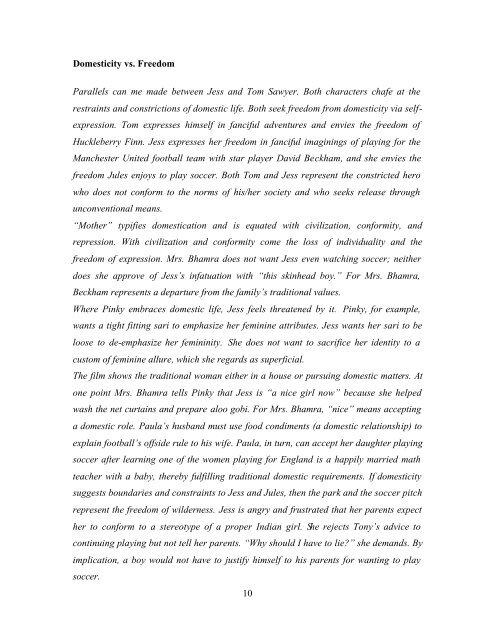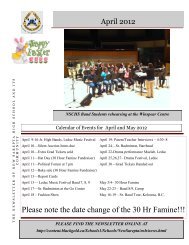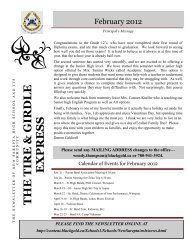Bend It Like Beckham - Black Gold Regional Schools
Bend It Like Beckham - Black Gold Regional Schools
Bend It Like Beckham - Black Gold Regional Schools
Create successful ePaper yourself
Turn your PDF publications into a flip-book with our unique Google optimized e-Paper software.
Domesticity vs. Freedom<br />
Parallels can me made between Jess and Tom Sawyer. Both characters chafe at the<br />
restraints and constrictions of domestic life. Both seek freedom from domesticity via self-<br />
expression. Tom expresses himself in fanciful adventures and envies the freedom of<br />
Huckleberry Finn. Jess expresses her freedom in fanciful imaginings of playing for the<br />
Manchester United football team with star player David <strong>Beckham</strong>, and she envies the<br />
freedom Jules enjoys to play soccer. Both Tom and Jess represent the constricted hero<br />
who does not conform to the norms of his/her society and who seeks release through<br />
unconventional means.<br />
“Mother” typifies domestication and is equated with civilization, conformity, and<br />
repression. With civilization and conformity come the loss of individuality and the<br />
freedom of expression. Mrs. Bhamra does not want Jess even watching soccer; neither<br />
does she approve of Jess’s infatuation with “this skinhead boy.” For Mrs. Bhamra,<br />
<strong>Beckham</strong> represents a departure from the family’s traditional values.<br />
Where Pinky embraces domestic life, Jess feels threatened by it. Pinky, for example,<br />
wants a tight fitting sari to emphasize her feminine attributes. Jess wants her sari to be<br />
loose to de-emphasize her femininity. She does not want to sacrifice her identity to a<br />
custom of feminine allure, which she regards as superficial.<br />
The film shows the traditional woman either in a house or pursuing domestic matters. At<br />
one point Mrs. Bhamra tells Pinky that Jess is “a nice girl now” because she helped<br />
wash the net curtains and prepare aloo gobi. For Mrs. Bhamra, “nice” means accepting<br />
a domestic role. Paula’s husband must use food condiments (a domestic relationship) to<br />
explain football’s offside rule to his wife. Paula, in turn, can accept her daughter playing<br />
soccer after learning one of the women playing for England is a happily married math<br />
teacher with a baby, thereby fulfilling traditional domestic requirements. If domesticity<br />
suggests boundaries and constraints to Jess and Jules, then the park and the soccer pitch<br />
represent the freedom of wilderness. Jess is angry and frustrated that her parents expect<br />
her to conform to a stereotype of a proper Indian girl. She rejects Tony’s advice to<br />
continuing playing but not tell her parents. “Why should I have to lie?” she demands. By<br />
implication, a boy would not have to justify himself to his parents for wanting to play<br />
soccer.<br />
10






